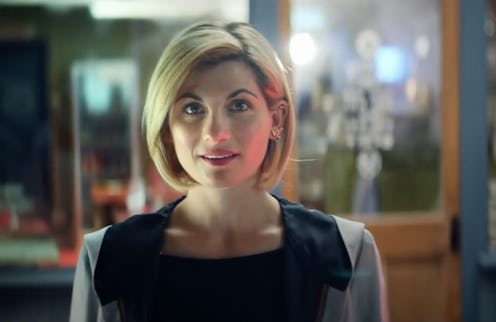Entertainment
These 'Doctor Who' Stars Shared Some Important Thoughts On Representation In TV

The wistful fantasies of legions of female Whovians were answered when Jodie Whittaker was announced as the first female doctor in Doctor Who Season 11. To date, women on the show have been limited to companions and other supporting roles; so casting a woman as the Time Lord, therefore, is a pretty giant move. What's more, two of the Thirteenth Doctor's companions will be played by actors of colour, a vital step towards increased black, Asian, and minority ethnic (BAME) representation in a period where lead roles on British TV remain resolutely white. And the significance of the casting isn't lost on the actors.
During an interview with the Radio Times, Jodie Whittaker explained why her role as the first female doctor is so major for women. She said: "Now it isn’t just attainable for half of the population. Now the other half can be the Doctor as well. Girls will no longer just think, 'Oh, I could be a companion.'"
She added: "Being the first female Doctor and showing children that their heroes in shows don’t always look the same is a huge honour for me."
When Whittaker's casting was announced, the BBC looked into the number of female lead roles on British television, comparing the statistics with those from a decade prior. Its conclusion? "The number of female-led dramas — and the ones in which women share the lead — have slightly increased, along with their popularity with audiences." But, the organisation added, "there's a long way to go before parity is achieved."
Whittaker isn't the only one to acknowledge the need for a female Time Lord. Showrunner Chris Chibnall told the Radio Times: "I felt the time was right for a female Doctor — I felt the audience were ready for it, the world was ready for it."
He continued: "I think if we hadn’t done it, we would have been behind the world — and Doctor Who has to be out front leading the world, showcasing all the amazing things out there. So it was never a question in my mind. It was time."
Though Doctor Who has cast actors of colour as companions in prior series, including Noel Clarke's Mickey Smith, Freema Agyeman's Martha Jones, and, in the latest series, Pearl Mackie's Bill Potts, there's still a significant way to go in terms of diversifying the series, and British television beyond it. Actors Tosin Cole and Mandip Gill, will be playing companions Ryan Sinclair and Yasmin Khan in the new series.
Cole and Gill discussed diversity and representation on the TV with the Radio Times. Gill explained: "When I was younger I didn’t feel I was represented in popular culture — you couldn’t get a brown doll in the shops and you didn’t see many brown people on TV."
Many people of colour across the U.K. share Gill's feelings of exclusion. In a foreword to a 2017 Ofcom report on diversity in British broadcasting, Chief Executive Sharon White said, "Ethnic minority groups feel they are portrayed neutrally or negatively on television." After a 2016 study by Attentional (an advisory organisation to the entertainment industry), which looked into what TV programmes were most popular with different ethnic groups, CEO David Graham commented, "Members of minority ethnic groups do not identify themselves in many of our most-watched narratives," as reported by the Guardian.
In addition, in 2017 the BBC released salary data for all its employees, across scripted drama, news, radio, and other genres; the Guardian found that the highest-earning star, Chris Evans, "took home roughly the same as all of its BME high-earners put together." The BBC responded to questions about the diversity of their employees with a statement which read: "On gender and diversity, the BBC is more diverse than the broadcasting industry and the civil service. We have set the most stretching targets in the industry for on-air diversity and we’ve made progress, but we recognise there is more to do and we are pushing further and faster than any other broadcaster."
Doctor Who newbie Cole revealed in an interview with Radio Times that he turned to American shows as a child, where he saw himself reflected: "I used to watch The Fresh Prince of Bel-Air and My Wife and Kids because it’s easier to relate to what you see around you. That’s not to say that I didn’t watch other shows, but there’s an easier acceptance when you see something familiar to you."
"Now diversity is more of a discussion, whether it be gender or ethnicity," Cole says. "We still have a long way to go, in terms of equal rights and equal representation on screen, but it’s exciting for the kids to see people like themselves in the new series — and for girls to become superheroes."
While progress has been made, as Cole suggests, there's still much more work to be done on the matter of representation, both in Doctor Who and beyond. Most glaringly for the BBC show? The role of Doctor has never been played by an actor of colour. Limiting actors of colour to supporting roles is not true representation, and ensuring diverse casting of lead roles is vital for the television and film industry as a whole. It's crucial to acknowledge that not all people from marginalised groups are represented by a white female Doctor.
All eyes on the next regeneration, then — here's hoping it redresses that imbalance.